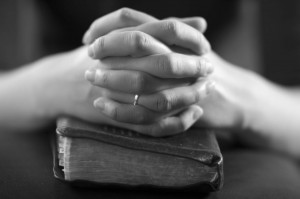The Superior Supernatural Weapon
What comes to mind when you think of the Word of God? Listen to the author of Hebrews describe the Word of God in Hebrews 4:12 –
12 For the word of God is living and powerful, and sharper than any two-edged sword, piercing even to the division of soul and spirit, and of joints and marrow, and is a discerner of the thoughts and intents of the heart.
It is living and powerful. It likens the Word of God to a two-edged sword. In fact, it is described as “sharper than any two-edged
sword” – much sharper than any sword on the face of the earth. That makes it the superior supernatural weapon that has been placed in our hands. Men have died by God’s sovereign providence for you and I to possess the Word of God in our hands. It comes as no surprise that God preserves His Word. “The grass withers, and the flower falls off, but the word of the LORD endures forever” (1 Pet 1:24-25).
But beware, my beloved, the Word of God cuts and it cuts deep. It pierces. It penetrates. It divides. It exposes. It judges; it discerns.
Less you think of a battle sword used by William Wallace, which was said to measure 4 feet 4 inches (132 cm)

in length, this sword is different. The Greek term used here is μάχαιρα (machaira). It was short, much like a dagger. It was this kind of sword that was carried by those who came out to arrest Jesus (Matt 26:47). It was the same kind of sword that was used by Peter to cut Malchus’ right ear off (Jn 18:10). It was commonly used for execution and dreadful bloodshed. It was also the common weapon of choice to carry while traveling, usually in a sheath (cf. Jn 18:11). It was the Apostle Paul who would later make use of this sword to speak of the Sword of the Spirit (Eph 6:12). Small, easily carried, but a powerful spiritual weapon nonetheless. There was even a Jewish saying: “he who utters the Shema is as if he held a two-edged sword.”
To what end? What is this superior supernatural weapon able to do? To pierce “even to the division of soul and spirit, and of joints and marrow, and is a discerner of the thoughts and intents of the heart.” Consider the following words from the Biblical scholar and theologian Brooke Foss Westcott (1825-1901) –
“The Word has unrivaled keenness: it pierces in fact to the most secret parts of man; and that not as an instrument merely but as a judge of moral issues. It is sharper than the most formidable weapon of earthly warfare: it finds its way through every element of our earthly frame: it scrutinizes the affections and thoughts of which our bodily member are the present organs…The Word of God analyses, lays bare, reveals in their true nature, reduces to their final elements, all the powers of man.”
It is to be embraced by the believer for it humbles us with a true knowledge of ourselves and causes us to run to throne of Grace when we are presented with convicting truth. The Word of God not only pierces but penetrates to the very inmost core of the individual, into the innermost heart. It produces conviction, unfolding to us in the light of truth where we are wrong, where we are wicked in our thoughts and desires. This is that “destructive energy” (Brown) of the Word of God. It is the deathful energy of a two-edged sword. Imagine a sharp sword dividing bone and marrow. Talk about intense pain. God’s Word builds us up and tears us down – building up in our weakness and tearing down where we are prideful. The Word of God encourages us, uplifts us, comforts us. Yet it also humbles us, convicts us, brings us to the end of ourselves. It is a dangerous enterprise to be exposed to Scripture.
The Scottish minister and theologian John Brown (1784-1858) rightly said –
“He who is exposed to it is in a situation far more hazardous than he into whose vitals a sharp two-edged sword seems just about to be plunged.”
So why expose yourself to such danger? Why embrace such a superior spiritual sword to do its work in our lives? Because where God cuts and prunes, He promises to heal and produce fruit (cf. Jn 15:2). As the Word of God is living and active, may God revive our hearts to His will and purpose in our lives, never becoming cold or dead in our affections for His powerfully efficient, all-knowing, penetrating Word of God. Pray like the psalmist in Psalm 143:11a –
11 Revive me, O Lord, for Your name’s sake!
